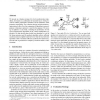Free Online Productivity Tools
i2Speak
i2Symbol
i2OCR
iTex2Img
iWeb2Print
iWeb2Shot
i2Type
iPdf2Split
iPdf2Merge
i2Bopomofo
i2Arabic
i2Style
i2Image
i2PDF
iLatex2Rtf
Sci2ools
133
click to vote
ESTIMEDIA
2004
Springer
2004
Springer
Trace-based evaluation of clock synchronization algorithms for wireless loudspeakers
We present an evaluation strategy for clock synchronization algorithms. It is based on a combination of measured traces, which provide for realistic performance estimation, and of simulation, which guarantees repeatability. The evaluation strategy includes parameteroptimization to allow for a fair comparison of algorithms; a generalpurpose evolutionary optimizer is used for this purpose. The strategy is applied in a case study, evaluating the performance of four clock synchronization algorithms in the wireless loudspeakers application. We find that the phase-locked loop algorithm, as well as the linear-regression and the gradient algorithm achieve sufficient synchronization in a lightly loaded network. Only the local selection algorithm is able to maintain sufficient synchronization under heavy network load, as generated for example by concurrent audio or video streaming.
Clock Synchronization Algorithms | ESTIMEDIA 2004 | Evaluation Strategy | Sufficient Synchronization |
Related Content
| Added | 01 Jul 2010 |
| Updated | 01 Jul 2010 |
| Type | Conference |
| Year | 2004 |
| Where | ESTIMEDIA |
| Authors | Philipp Blum, Lothar Thiele |
Comments (0)

